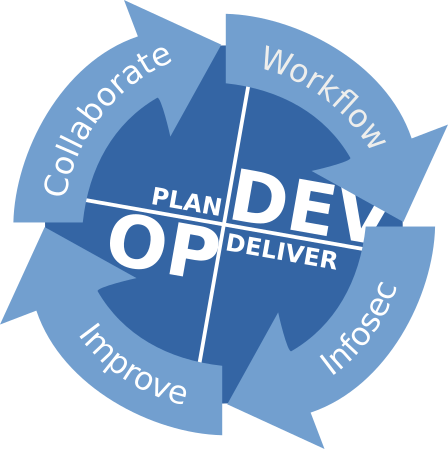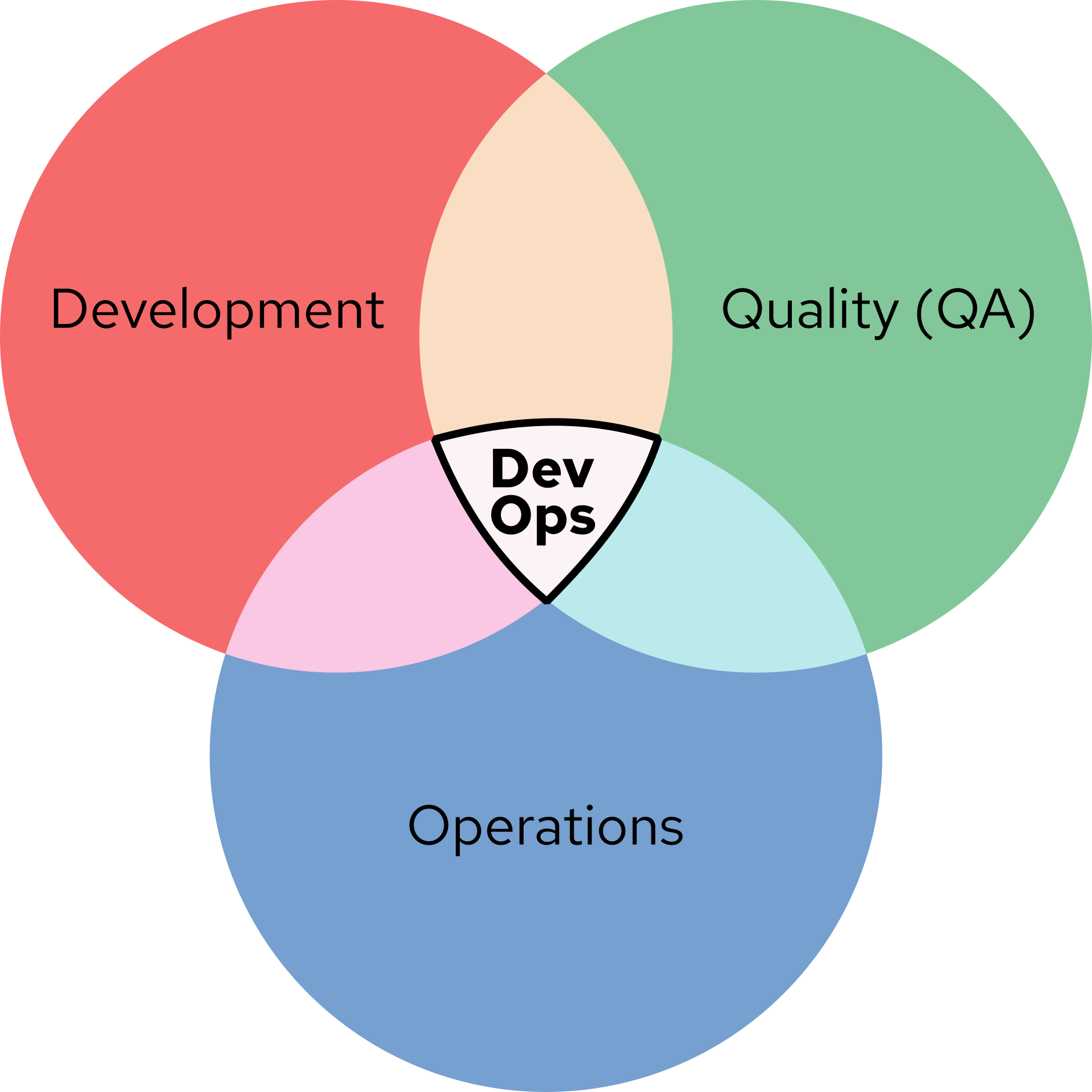Why would you want to build a DevOps culture? There are many benefits to the streamlined collaboration of the development and operations teams. A major goal is efficiency: Increasing the speed of new software deployments and reducing idle time for workers. Fostering trust between colleagues can improve employee satisfaction, produce new innovations, and positively impact profitability.
DevOps is a broad philosophy with a range of interpretations. In other words, you can visit 40 companies and find 40,000 different ideas about using DevOps effectively in the workplace. This diversity of opinion is actually a good thing–so many perspectives are useful for building stronger teams. This guide will look at the top tips for encouraging better collaboration between colleagues within a DevOps culture.
Each section offers a different aspect of DevOps culture and looks at ways to introduce it into your workforce.

(Seth Kenlon, CC BY-SA 4.0)
Continuous development of processes
This core tenet of DevOps culture sets it apart from many other types of workplace ethos. The DevOps philosophy says that it is essential to make mistakes because it shows you are trying out new ideas.
The heart of DevOps culture is a commitment to evolving creativity. Practically, that means not yelling at your direct reports when test results show that things were better before they changed it. It means recognizing that progress is not linear and success is never a straight line.
DevOps expert Gene Kim advocates for risk-taking and experimentation. This implies letting your team work on unusual tasks to find new insights.
Should your organization be profit-driven? Can you allow your teams to try something new? I'm talking about something other than unrelated passion projects. Continuous process development means being open to upgrading present methods. Great sales leaders appreciate that results matter more than presenteeism, so it is always crucial to focus on how teams are working rather than how much.
Readily give feedback and actively seek it
Increased trust between individuals is another key feature of a thriving DevOps culture. Whether your staff is learning how to build affiliate network contacts or trying to design their next UX survey, everyone should be open to feedback on their work. But this will never happen until your teammates respect each other's opinions and trust that feedback is given in a spirit of good intention.
This culture may sound impossible to cultivate; indeed, some companies will struggle to achieve this more than others. Granted, a large part of the success of giving and receiving feedback depends on the personalities of your employees. It is possible to screen for this during the recruitment process.
Before you expect staff to readily offer feedback to colleagues and seek it in the first place, you should lead by example. Members of the C-suite should be modeling this behavior, openly asking members of the company to pose probing questions about their strategic decisions, and providing balanced feedback.

(Seth Kenlon, CC BY-SA 4.0)
Always look for improvements
Building on increased intellectual trust between colleagues, your team should look for ways to improve its work. The nature of DevOps means the software development team will be producing deployments more rapidly than with traditional approaches.
However, this culture of openness to improvement can positively impact departments beyond development and operations. Ask yourself what other areas of your business could do with a burst of optimism.
Be on the lookout for training and upskilling opportunities. Even if a training course is less salient than advertised, the chance to network with industry professionals and build contacts for the future can only enhance the diversity of ideas within your organization.
Save ideas for later development
Part of your DevOps toolchain should be a heavily used account on Git. You can use Git as a common repository for scripts produced during software development and other related projects. Known as "version control," Git allows programmers to save iterations of their work and reuse or improve the work of others.
You're aiming for the ability to keep hold of good ideas for future use. A certain pathway did not work out for specific reasons. However, just because that set of ideas was wrong for the time it was conceived does not mean it can never become helpful in the future.
As the entire focus of DevOps rests on end-to-end ownership of software in production, saving iterations of developments truly supports this principle. You want to see an improved focus on and commitment to the software testing project at hand.
A simple way to incorporate this is to request that developers include ideas for future work in the developer contract and final project report. Make sure tech services managers know they should ask for examples of side-branching ideas that cropped up during the build. The more minds aware of these little innovations, the more likely someone will remember one when needed.
Sit close together (physically or virtually)
The goal is to share a common understanding of one another's job roles and how they interrelate. You can achieve this in a few simple ways, summarized by three words: Sit close together. Invite other teams to your meetings and share user feedback reports in their entirety. Have lunch together, plan virtual happy hours together, and generally make sure your colleagues are in close proximity. About 90% of teams with a mature DevOps protocol report a clear understanding of their responsibilities to other teams compared to only about 46% of workers in immature DevOps teams.
Although it can be tempting to form cliques with like-minded folk and only hang out with staff hired to carry out the same tasks as you, this is terrible for the business as a whole. Whether you like it or not, all humans are multi-faceted and capable of contributing their unique talents to a whole host of scenarios.
The idea of closer collaboration is to honor the ability of anyone to suggest improvements to the products or work processes going on around them. If you only ever sit at a distance from the other departments within the company, you will miss countless opportunities to share intelligent ideas. After all, you often learn best in the free flow of ideas during a conversation.
Commit to automation
You should be looking to automate mundane and repetitive tasks in the name of efficiency and process acceleration. Every industry has boring–and quite frankly, silly–exercises carried out daily or weekly.
Whether this is manually copying data from one page to another or typing out audio transcripts by hand, staff at every level should insist that machines take on such burdens where possible. The reality is automation technology advances every single year, and operational processes should, too. Automation testing is so crucial to DevOps that it is the second principle of the CALMS framework (the "C" of which stands for "culture").
How can you make this happen? Invite staff to openly express which aspects of their job they feel could be automated and then–here is the crucial part–support the facilities needed to automate them. That might mean a $600 annual subscription to a software program, a complete enterprise application modernization, or two days of developers' time to build a new tool to use in-house.
Either way, you should assess the benefits of automation and consider how much time you could save for everyone. DevOps statistics continually indicate just how much better off modern companies are by integrating these beneficial principles year after year.
Explore new ways of working successfully
A culture shift doesn't happen overnight. The sooner you start, though, the sooner you see results. In my experience, people embrace change when it's a genuine improvement on what has gone before. DevOps provides a framework for such improvements. Whether you're just getting started with DevOps in your organization or simply want to improve your existing culture, consider the above points and how they relate to your organization's future.







Comments are closed.